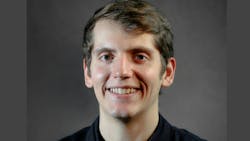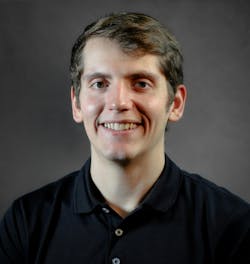Generation Now Leadership: Growing Engineering Talent From the Ground up at Conceptual Innovations
Name: Tyler Bretes
Age: 25
Company: Conceptual Innovations
Education: Bachelor’s in Mechanical Engineering
Position: Research and Development Engineer
Tyler Bretes has always had loose connections to manufacturing, with both his parents and extended family members working in the field throughout his life. But his fascination with making things wouldn’t be fully realized until high school.
During Bretes’ freshman year, a group of seniors asked the school principal if they could get involved in FIRST Robotics, a program where high school students design and build a robot for competitions, with the help of mentors.
“I was loosely friends with some of their younger siblings, so I got roped into the mix, and then all of a sudden we have this robotics team,” Bretes says. “We had no idea what we were getting into; the adults that we were with had no idea what we were getting into.”
The team worked with a local company to build the robot, but it was the competition itself that made a lasting impact on Bretes.
Falling for Manufacturing and Robotics
“The second you get to competition, it’s like this whole new world,” Bretes says. He credits these robotics competitions as the first major experience that sparked his passion for manufacturing. “If you ever get to experience a FIRST Robotics competition … it’s unlike anything else.”
Bretes’ world changed again during his junior year when engineer Elmer Lee became a mentor for the robotics team. At the time, Lee worked for Caster Concepts, which makes a variety of industrial casters, wheels and accessories.
Lee’s involvement as a mentor changed the game. Before long, the students were confidently engineering.
“He helped us figure out how to identify problems and then understand that there is a way for us to solve them,” Bretes says. “It was revolutionary.”
The students went to Caster Concepts in the evenings to work on design. This is where Bretes experienced a second spark of passion for making things.
“We would sit in this engineering office and draw a part, and then we turn around and it’s off the laser on the ground behind us,” he says. “That was my first real exposure to manufacturing … that is what got me hooked.”
From then on, Bretes says his excitement for engineering only continued to grow.
“Every single day, I wanted to do nothing other than robotics,” he says. Bretes even extended his work into the evening with CAD software he had at home.
At the end of Bretes' senior year, Lee asked him to stop by Caster Concepts after school.
Bretes went to Caster Concepts wearing a T-shirt and cargo shorts and chatted with Lee about what he wanted to do in the future, unaware that he was actually in the midst of a job interview.
After the chat was over, “[Lee] is like, ‘How do you think your first interview went?’ I was like ‘Wait, what? What are you talking about? First interview?’ And then he tells me, ‘Hey, I would love it if you could come and work over the summer at Caster as an intern,’” Bretes says.
He enthusiastically accepted and got to work right away.
“Wednesday’s the last day of school. The following Monday I started working at Caster as an engineering intern.”
A Point of Pride: Earning a Patent
For the next few years, Bretes interned while attending college. He split his time between engineering and working in production for Conceptual Innovations, the robotics division of Caster Concepts. It makes powered material handling solutions, including motorized carts and casters.
It was during this internship that Bretes, Lee and the other interns began working on the first iteration of what would become one of his greatest achievements: HaloDrive, an omnidirectional drive system that “replaces the job of something that previously only an overhead crane can do,” he says.
“We used all of the parts that I was super familiar with from FIRST Robotics in high school, and we made a small-scale version.” All of a sudden, Lee said he wanted to show the technology to a leading aerospace manufacturer, and before he knew it, Conceptual had orders for industrial versions of the system.
“It is so incredible to see the iterations that we made of this HaloDrive on a small scale and how it has transformed into this incredible product that seriously solves big problems,” Bretes says.
The experience earned Bretes his first patent, and he says the HaloDrive development is what he is most proud of.
Throughout his time in college, Caster/Conceptual sponsored tuition, and in the spring of 2023, Bretes received his degree in mechanical engineering.
“Caster/Conceptual supported me the whole way through that, which 100% made it possible for me to get my degree,” Bretes says. Following graduation, he started his current full-time position as research and development engineer.
From Intern to Mentor
Bretes’ responsibilities include designing, building and debugging his own R&D projects, production testing, on-site installations, risk management and building project timelines. In addition, Bretes now oversees the internship program that he was once part of, managing intern projects and providing guidance when needed.
Bretes relates to many of the interns through their common experience of high school robotics, and he wants to share that enthusiasm and energy with employees who come from different backgrounds.
As a young leader, Bretes aims to foster a team environment by “always trying to be the person that people want to work with.” It’s a piece of advice Bretes says he “stole” from Adam Savage of “MythBusters” fame.
“If you’re able to work with people and people want to work with you, you don’t have to solve problems alone,” Bretes says.
Generation Now stories focus on challenges and opportunities facing industry as multiple generations of leaders take on responsible roles in manufacturing. The first piece ran in the spring of 2022 and won a national award for manufacturing business writing.
Stories include:
- Generation Now Leadership: Part 1, Falling Into Manufacturing at Smucker's
- Generation Now Leadership: Part 2, Fast-Track Training at Timken
- Generation Now Leadership: Part 3, Career Advancement by Design at Northrop Grumman
- Generation Now Leadership: Part 4, Co-op to Advanced Manufacturing Management in a Decade at Freudenberg-NOK
- Generation Now Leadership: Part 5, Finding Passion at Precision Plus
- Generation Now Leadership: Part 6: From Military to Manufacturing at Graphic Packaging International
- Generation Now Leadership: Climbing the Ladder at Sandvik Coromant
- Generation Now Leadership: Manufacturing’s Next Generation Steps Forward
- From Gen Z to C-Suite: an Intergenerational Conversation on Innovation
About the Author
Anna Smith
News Editor
News Editor
LinkedIn: https://www.linkedin.com/in/anna-m-smith/
Bio: Anna Smith joined IndustryWeek in 2021. She handles IW’s daily newsletters and breaking news of interest to the manufacturing industry. Anna was previously an editorial assistant at New Equipment Digest, Material Handling & Logistics and other publications.


